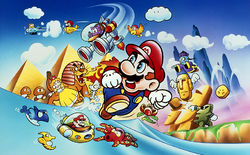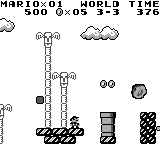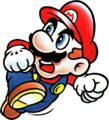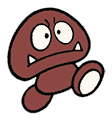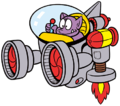Super Mario Land
- This article is about the video game for the Game Boy. For the series as a whole, see Super Mario Land (series). For the microgame from WarioWare Gold, see Super Mario Land (WarioWare Gold). For the microgame from WarioWare: Get It Together!, see Super Mario Land (WarioWare: Get It Together!).
- Not to be confused with Super Mario 3D Land.
Template:Infobox Super Mario Land is the first installment in the titular Super Mario Land series, released as a launch title for the Game Boy in 1989 as the first handheld title in the series. Unlike previous installments, the game takes place in Sarasaland rather than the Mushroom Kingdom, and introduces Princess Daisy, a new character serving as the damsel-in-distress in place of Princess Peach. Tatanga, a malevolent alien with powers of hypnosis, serves as both the main antagonist and final boss. Unlike previous games, Super Mario Land was not developed by Shigeru Miyamoto and Nintendo's EAD division, but by Nintendo R&D1, with Gunpei Yokoi as guiding producer.
In addition to being the first of the three Super Mario Land games, this game is also the shortest, comprising of only twelve levels spanning four different worlds. It was succeeded by Super Mario Land 2: 6 Golden Coins, which introduced Wario, and Wario Land: Super Mario Land 3, which is also the first installment in the Wario Land series. They were originally excluded from the main Super Mario series, but were included alongside the more traditional games for the 30th anniversary of Super Mario Bros.,[1] and the history page from the Mario Portal and "The official home for Mario" websites.[2][3]
This game is notable for its inclusion of different or unrelated enemies and sound effects compared to traditional titles. Additionally, though the game did not receive critical acclaim, mainly due to its graphical capabilities and shortness in length, it sold extremely well, eventually totaling over 18 million copies sold, making it the best-selling game for the Game Boy overall. The game was later rereleased for the Nintendo 3DS's Virtual Console in 2011, over twenty years after the original game was released.
Story
The following text is taken directly from the instruction booklet.
Once upon a time, there was a peaceful world called Sarasaland. In this world there were 4 kingdoms named Birabuto, Muda, Easton and Chai. One day, the skies of Sarasaland were suddenly covered by a huge black cloud. From a crack in this cloud, the unknown space monster Tatanga emerged to try to conquer Sarasaland. Tatanga hypnotized the people of all the kingdoms so that he could control them in any way he liked. In this way he took over Sarasaland. Now, he wants to marry Princess Daisy of Sarasaland and make her his queen. Mario came to know of these events, and he has started on a journey to the Chai Kingdom where Princess Daisy is held captive, in order to restore peace to Sarasaland. Can Mario defeat Tatanga, release people from his interstellar hypnosis, and rescue Princess Daisy? It's all up to you and Mario's skill. Go for it Mario!
In this game, Mario is tasked with saving Princess Daisy and the inhabitants of Sarasaland from Tatanga. To do so, he must travel across and conquer all four kingdoms - the Birabuto Kingdom, a desert kingdom based on ancient Egypt, the Muda Kingdom, an aquatic kingdom, the Birabuto Kingdom, a kingdom partially based on Easter Island, and the Chai Kingdom, a kingdom inspired by mythical ancient China.
The first three kingdoms are each guarded by a boss Mario must defeat to rescue an enemy disguised as Princess Daisy. These three kingdoms are led by the Sphinx King Totomesu, sea dragon Dragonzamasu, and moai Hiyoihoi. A cloud known as Biokinton is fought in the fourth kingdom. In the end, Mario must board the Sky Pop to battle and defeat Tatanga himself in his heavily armed airship, the Pagosu. After he is defeated, Mario rescues Daisy and the two ride off together in a spaceship.
It is revealed in the sequel, Super Mario Land 2: 6 Golden Coins, that Wario took advantage of the events in this game to take over Mario's castle. In this game, Tatanga guards a Golden Coin, presumably working under Wario.
Gameplay
Super Mario Land is very similar to previous Mario platformer games. allows the player to jump, while
serves as the action command, allowing Mario to run faster.
controls where Mario walks or runs. The player may also pause at anytime with
. Jumping on an enemy usually defeats it and earns the player points. When Mario is Superball Mario, or if he is driving the Marine Pop or Sky Pop,
fires out projectiles at Mario's enemies.
Most of the bosses can either be beaten via physical attack, or by jumping on a switch behind the boss. Collecting one hundred coins earns Mario an extra life, and if he manages to earn 100,000 points, he gains an extra continue to use in the event all lives are lost.
Mario is vulnerable as Small Mario. When he gets a Super Mushroom, he grows slightly in size and is able to take damage once without losing a life, instead reverting back to his small state. If Mario collects a Superball Flower, he becomes Superball Mario, and is able to shoot Superballs at his enemies. If Mario happens to find and collect a Star, he becomes invincible, and is able to defeat any enemy just by touching it. These effects are temporary and last a short time.
At the end of every non-boss level, the player reaches a Goal tower with two entrances. The lower entrance takes Mario directly to the next stage, while the upper entrance sends him to a Bonus Game for the chance to win a Superball Flower or one, two, or three extra lives.
After the main game is beaten, the Mushroom icon on the title screen changes to an icon of Mario's head. This allows the player to play through the game once more, with additional enemies spread throughout the levels, though no further changes occur to increase the difficulty. Beating this game unlocks a level select option. As the game has no battery backup, the title screen reverts to the standard version upon switching the Game Boy off, resetting the game, or having the batteries run out.
Controls
Game Boy
| Button | Action |
|---|---|
Nintendo 3DS
| Button | Action |
|---|---|
Worlds and levels
Super Mario Land utilizes Sarasaland as the main setting rather than the Mushroom Kingdom. The land is divided into four kingdoms serving as the corresponding worlds of the game - the Birabuto Kingdom, the Muda Kingdom, the Easton Kingdom, and the Chai Kingdom, respectively. Each world consists of three levels. These levels normally feature music, backgrounds, and enemies relevant to the themes of their respective worlds. Due to the length of the game, as well as the amount of enemies featured in the game, most enemies are indigenous to one world, while some only appear in one level. At the end of the first two levels of each world, Mario reaches a Goal allowing him to advance to the next level immediately, or complete a Bonus Game for an item beforehand. At the end of the third and final world of each level, Mario fights and defeats a boss to rescue an enemy disguised as Daisy, with the exception of the Chai Kingdom, where he must defeat two bosses, including Tatanga, to rescue the real Daisy.
| Levels | ||||
|---|---|---|---|---|
| Birabuto Kingdom | ||||
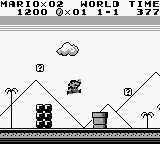
| ||||
| The first world in the game, a desert-themed kingdom based on ancient Egypt. The first two levels feature pyramids in the background, while the third and final level takes place inside a pyramid, as evidenced by hieroglyphics. This world features a number of common, beginning enemies, such as Goombos, Bombshell Koopas, Flies, Bunbuns, Piranha Plants, and Gaos. King Totomesu, a large Gao, is fought at the end of the final level of this world. Defeating him rescues a Fly disguised as Princess Daisy. | ||||
| Image | Level | Description | ||
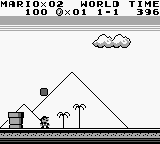 |
World 1-1 | The first level in the game. Pyramids and palm trees appear in the background. The level is very straightforward, featuring common enemies and items, as well as two pipes along the way, both of which lead to rooms filled with coins. | ||
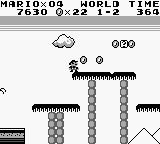 |
World 1-2 | The second level features little actual ground, requiring Mario to use blocks and palm trees as platforms alternatively. | ||
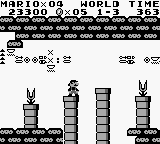 |
World 1-3 | The third and final level of the Birabuto Kingdom. The level takes place in a pyramid with hieroglyphics on the walls. King Totomesu is fought at the end. | ||
| Muda Kingdom | ||||
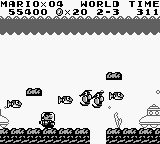
| ||||
| The second world of the game, a water-themed kingdom. The name is inspired on Mu, a proposed lost continent, and Bermuda. This is the only world to have one level featuring the Marine Pop. The first two levels take place in a tropical area with water below, while the third level takes place entirely underwater. Yurarins, Yurarin Boos, Honens, Goombos, Piranha Plants, Bombshell Koopas, Mekabons, Gunions, Torions, and Tamao are all enemies featured here. Dragonzamasu, a large Yurarin Boo, is fought at the end and defeated to rescue a Gunion disguised as Princess Daisy. | ||||
| Image | Level | Description | ||
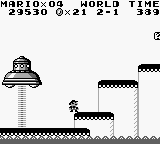 |
World 2-1 | This level appears to take place on a beach, with a layer of water below. | ||
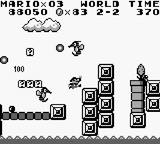 |
World 2-2 | Mario must use blocks to cross over water throughout the stage. | ||
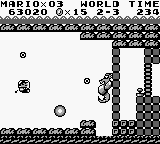 |
World 2-3 | The entire level takes place underwater, requiring Mario to use the Marine Pop to defeat enemies, as well as the boss, Dragonzamasu. | ||
| Easton Kingdom | ||||
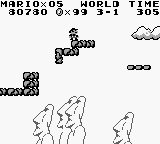
| ||||
| The third world of the game, with the levels and enemies resembling Easter Island. Large Moai stone statues appear in the backgrounds, while Batadons, Bombshell Koopas, Bullet Biffs, Piranha Plants, Tokotoko, Ganchan, Suu, and Kumos are all enemies featured in this territory. Hiyoihoi, a large stone head who attacks by chucking Ganchan at Mario, is fought at the end of the final level to rescue a Kumo disguised as Daisy. | ||||
| Image | Level | Description | ||
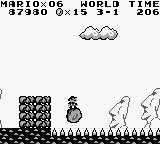 |
World 3-1 | A rocky level featuring statues in the background. | ||
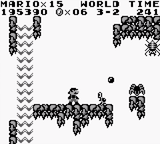 |
World 3-2 | This level takes place in a cave with several waterfalls. | ||
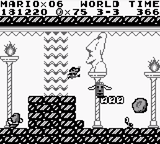 |
World 3-3 | The majority of this level takes place on rocky terrain, with Hiyoihoi being fought in a cave at the end. | ||
| Chai Kingdom | ||||
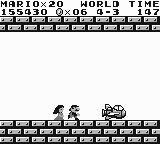
| ||||
| The fourth and final world in the game. The level architecture, background music, and certain enemies appear to be based off mythical ancient China. Chai references a Chinese name and surname, as well as a type of tea that originated in India. This is the only world to have a level feature the Sky Pop. Piranha Plants, Pionpis, Bullet Biffs, Goombos, Nyololins, Pompon Flowers, Chikakos, Chickens, Genkotsu, and Roketons are all enemies found here. Biokinton and Tatanga, the final boss and main antagonist, are both fought at the very end to rescue the true Princess Daisy. | ||||
| Image | Level | Description | ||
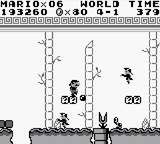 |
World 4-1 | This level takes place in a bamboo forest with mountains in the background. | ||
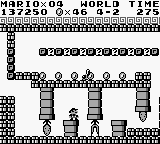 |
World 4-2 | A mountain range level with floors made of blocks. There is a hidden room filled completely with coins. | ||
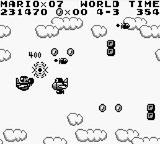 |
World 4-3 | The final level in the game. Mario fights two bosses, Biokinton and Tatanga, in the Sky Pop. | ||
Items
This game features a small variety of items, a mix of both new and classic ones. The 1 UP Heart and Superball Flower both debuted in this game.
| Image | Name | Description |
|---|---|---|
| 1 UP Heart | Replacing 1-Up Mushrooms, most likely to distinguish them from regular Super Mushrooms, 1 UP Hearts are found in Mystery Blocks and Brick Blocks. Collecting one grants Mario an extra life, though it must be collected before it falls through the ground. | |
| Coin | Coins may be found in Mystery Blocks as well as in groups. They may also be collected with Superballs. Each coin Mario collects earns him one hundred points, while collecting one hundred coins earns him an extra life. | |
| Star | Stars are rare items granting Mario brief invincibility from enemies. Rather than the usual invincibility theme, two loops of an excerpt from the famous "Galop infernal" from Orpheus in the Underworld by Jacques Offenbach, a tune most commonly associated with the can-can, play while Mario is invincible. | |
| Superball Flower | A new item, the Superball Flower can only be found in blocks. It allows Mario to shoot Superballs, which bounce off surfaces such as floors, walls, and ceilings to collect coins and defeat enemies, similarly to how the Fire Flower allows him to shoot fireballs. Mario's Superball form looks the same as his Super form. | |
| Super Mushroom | The classic Super Mushroom powers Mario up into Super Mario, allowing him to release Superball Flowers from blocks, break Brick Blocks, and take damage once before reverting to his Small form. |
Enemies
Around thirty different types of enemies appear in Super Mario Land. Some are found throughout multiple kingdoms, though most are exclusive to a certain kingdom. The only recurring enemy of previous Mario titles is the Piranha Plant, which goes under its Japanese name, Pakkun Flower. A few creatures seem to be closely related to enemies of earlier Mario games, though most of them are unique to Super Mario Land. Notably, their English names are generally very similar or identical to the Japanese names, with the only exception being Kumo, which is not the case for other localizations of Super Mario platformers.
Common
The following enemies and obstacles appear throughout several different courses, and are not indigenous to any particular kingdom.
| Image | Name | Original Name | Description | Points | Defeated By Superballs? |
|---|---|---|---|---|---|
| Goombo | Chibibo | Very similar to Goombas in name, appearance, and behavior. They walk forward until they hit a wall, then turn back. They may also fall off platforms. They can be defeated with a simple stomp. | 100 | ✓ | |
| Bombshell Koopa | Nokobon | A cross between a Koopa Troopa and a Bob-omb. If stomped, it turns into a bomb that cannot be moved and explodes a short time later, damaging Mario if the explosion touches him. | 100 | ✓ | |
| Piranha Plant | Pakkun Flower | Pops out of both pipes, some upside-down. They can only be defeated with Superballs. | 100 If Right-Side Up 400 If Upside-Down |
✓ | |
| Bullet Biff | Gira | Missile which fires from a variant Bill Blaster that periodically emerges from pipes. Can be stomped and defeated. | 400 | ✗ |
Birabuto Kingdom
The following enemies and boss are found only in the Birabuto Kingdom.
| Image | Name | Description | Points | Defeated By Superballs? |
|---|---|---|---|---|
| Fly | Bounces sideways. Can be defeated with one stomp or two Superballs. | 400 | ✓ | |
| Bunbun | Found only in 1-2. Flies horizontally, pausing periodically to drop spears. Can be stomped or hit with a Superball to be defeated. | 800 | ✓ | |
| Gao | Found only in 1-3, as well as 1-1 in Hard Mode. Sits still and breathes small balls of fire diagonally in Mario's direction, similar to a Fire Piranha Plant. Can be stomped or hit with a Superball to be defeated. | 800 | ✓ | |
| King Totomesu | Very similar to the Bowser fights from Super Mario Bros., this Gao breathes fireballs horizontally and periodically jumps. Can be defeated with five Superballs, or dodged to hit the kill switch behind him. | 5,000 | ✓ |
Muda Kingdom
The following enemies and boss are found only in the Muda Kingdom.
| Image | Name | Description | Points | Defeated By Superballs? |
|---|---|---|---|---|
| Honen | These undead Torion jump vertically from offscreen, similar to Podoboos, but can be stomped or torpedoed. | 100 | ✗ | |
| Yurarin Boo | Jump vertically, breathing fireballs diagonally in Mario's direction. Can be stomped or hit with two torpedoes. | 400 | ✗ | |
| Mekabon | Found only in 2-2. Turn back at edges. Throw their heads at Mario, which can be stomped but regenerate. The headless body can be stomped, or the whole robot with a Star, both of which finish them off. | 100 If Head Or Body Stomped, Or A Star Used 400 If Whole Body Is Stomped |
✗ | |
| Torion | Found only in 2-3 in groups of three, which make a U-turn when they reach the left edge of the screen. Can be killed with a single Marine Pop torpedo. | 100 | ✗ | |
| Yurarin | Found only in 2-3. Move right-to-left in a semi-random diagonal pattern. Can be killed with two torpedoes. | 400 | ✗ | |
| Gunion | Found only in 2-3. Can be killed with three torpedoes, but then turn into two fireballs which move in Mario's direction. | 800 | ✗ | |
| Tamao | Bounces around the boss area when fighting Dragonzamasu. Damages Mario when touched, but cannot be destroyed. | 0 | ✗ | |
| Dragonzamasu | A giant Yurarin Boo which moves up and down, shooting fireballs. Can be killed with twenty torpedoes. or the player can attempt to clear the way to the kill switch. | 5,000 | ✗ |
Easton Kingdom
The following enemies and boss are found only in the Easton Kingdom.
| Image | Name | Description | Points | Defeated By Superballs? |
|---|---|---|---|---|
| Batadon | Bounces along, similar to a Fly or Kumo but somewhat higher. Can be stomped or eliminated with three Superballs. | 800 | ✓ | |
| Ganchan | Rock-like enemies that bound around. They cannot be defeated, though can be used to cross long layers of spikes and reach higher ledges. | 0 | ✗ | |
| Tokotoko | Runs quickly. Can be stomped or hit with a Superball. | 400 | ✓ | |
| Suu | Found only in 3-2. Drop down from the ceiling at Mario, like slow Thwomps. Can be stomped or eliminated with two Superballs. | 400 | ✓ | |
| Kumo | Behave identically to Flies, and can also be defeated with one stomp or two Superballs. | 400 | ✓ | |
| Hiyoihoi | Throws Ganchan at Mario. Can be defeated with ten Superballs, or Mario can use the boulders to jump over Hiyoihoi and hit the kill switch. | 5,000 | ✓ |
Chai Kingdom
The following enemies and bosses are found only in the Chai Kingdom.
| Image | Name | Description | Points | Defeated By Superballs? |
|---|---|---|---|---|
| Pionpi | Zombie-like creatures that bounce at Mario. Stomping them gives only stuns them briefly, similar to Dry Bones. Two Superballs are required to actually finish them off. | 800 | ✓ | |
| Pompon Flower | Appear only in 4-2. Similar to a cross between a Volcano Plant and a Ptooie, they walk around, occasionally shooting a damaging spore vertically. They can be defeated by a stomp or two Superballs. | 800 | ✓ | |
| Nyololin | Appear only in 4-2. A snake with the same attack pattern as a Gao, which can also be defeated by a stomp or Superball. | 800 | ✓ | |
| Chicken | Appear only in 4-3. Tend to appear in loose clusters, and be brought down by a single Sky Pop missile. Also thrown out by Biokinton. | 400 | ✗ | |
| Roketon | Appear only in 4-3 and can be defeated with one missile. Fire Bullet Biffs backwards at Mario once past him, but do not fire anything forward (despite the official art). | 400 | ✗ | |
| Chikako | Appear only in 4-3. Float in mid-air, do not fire projectiles and require ten missiles to be destroyed, or the use of a Star. | 800 If Missiles Are Used 400 If Star Is Used |
✗ | |
| Genkotsu | Appear only at the end of 4-3. Function like slightly faster Piranha Plants that "punch" downwards. Cannot be destroyed. | 0 | ✗ | |
| Biokinton | Bounces all around the boss area, throwing chickens at Mario. To defeat him, he must be hit with twenty missiles, bringing forth Tatanga. | 5,000 | ✗ | |
| Tatanga | Moves around the right of the arena, firing large cannonballs, which almost immediately split into three smaller cannonballs, at Mario. These also absorb missiles, taking several hits before being dispersed (for one hundred points), making it harder to shoot the Pagosu. Once the warship is destroyed, Tatanga and the boss room vanish. | 5,000 100 Per Cannonball |
✗ |
Objects and obstacles
The following objects and obstacles exist within the game, either to help, hurt, or hinder Mario and his progress.
| Image | Name | Description |
|---|---|---|
| Brick Block | Blocks that break when struck. Some Brick Blocks contain rarer items, while some can produce a number of coins. | |
| Donut Block | Blocks that fall when stood on for a short time. | |
| Empty Block | A Mystery Block that has already been struck. | |

|
Kaitensuru Honō | Obstacles that behave similar to Rotodiscs from Super Mario Bros. 3, having an orb of flame orbit a Hard Block or Mystery Block. |
| Lift | A platform that can move Mario a short distance. | |
| Lift Block | A type of block appearing only in 1-3 and 3-2. Found in Hidden Blocks. Mario can ride them up to find coins or a Warp Pipe to a secret room. | |
| Marine Pop | A submarine found and used only in 2-3. Allows Mario to shoot torpedoes at a number of aquatic enemies, including the boss Dragonzamasu. Super Mushrooms and Stars affect the Marine Pop as well. | |
| Mystery Block | Blocks that produce items or coins when struck. | |
| Sky Pop | An airplane appearing only in the final level, 4-3. It fires missiles, used to defeat both Biokinton and Tatanga. After the real Daisy is rescued, she and Mario ride off in the Sky Pop. | |
| Switch | A switch found behind most bosses. Alternative to defeating the boss, Mario can avoid it and hit the switch to defeat them instead. | |
| Warp Pipe | Mario can enter most pipes to reach hidden or secret areas, as well as exit them. |
Revision
Later printings of the game featured alterations to the soundtrack[4] and fixed the screen wraparound glitch of the original release.[4] Unusually for a Virtual Console version, the 3DS release of Super Mario Land is based on the original version rather than the 1.1 revision.[4]
Development
- See also: List of Super Mario Land staff
Super Mario Land was initially set to be the pack-in game for the Game Boy. However, Henk Rogers of Bullet-Proof Software managed to convince NOA president Minoru Arakawa that Tetris would have wider appeal.[5]
The game was developed by Nintendo R&D 1 rather than by Nintendo EAD, making it the first Super Mario platformer to not be developed by EAD. Gunpei Yokoi acted as the producer and future R&D manager Satoru Okada was the director. Hirokazu Tanaka handled the sound effects and soundtrack.
Nintendo eShop description
- North American version
Ancient ruins, giant crabs, Koopa Troopas, flying stone heads, and hungry sharks await you in this rerelease of the 1989 Game Boy™ game. In the beautiful kingdom of Sarasaland, a mysterious alien has appeared and hypnotized the inhabitants while kidnapping Princess Daisy™ for himself! Travel over land, in the air, and underwater as Mario™ runs, jumps, and bounces his way to fortune and glory on his mission to save Princess Daisy and restore peace! Ancient ruins, tempestuous waters, and brand new challenges await!
- European version
Mario’s acclaimed Game Boy debut brings the plucky plumber to new territory: Sarasaland, where the evil space monster Tatanga has hypnotised the people and kidnapped Princess Daisy!
While the gameplay will be at first familiar, with the winning blend of platforming and power-ups, Super Mario Land is unique for introducing vehicles for Mario to ride: the Sky Pop aeroplane and Marine Pop submarine.
You'll need all your skills on land, in the sea and through the air, to traverse the four diverse kingdoms of Sarasaland in your quest to defeat the dastardly Tatanga and rescue Daisy.
Soundtrack
To tie in with the game's Japanese release, an original soundtrack for the game was published in that region by Nippon Columbia, featuring arrangements of ten of Tanaka's compositions by Ikuro Fugiwara, and performed by the "Mario Freaks Orchestra."
Reception
Super Mario Land received mostly positive reviews. The difficulty, the length of the game, the price, and the overall gameplay experience were among the most discussed aspects of the game. The game has received a 77.94% based on 8 reviews.[6]
Corbie Dillard of Nintendo Life noted the successors of the game as superior in both length and quality, praising the sequel, Super Mario Land 2: Six Golden Coins, as the better game, despite the price. However, he recommended playing the game in commemoration of Mario's first portable experience. Adam Riley of Cubed3 scored the game well, also acknowledging the standards achieved by later games, while also recommending the game as a short and sweet adventure.
Additionally, Lucas M. Thomas of IGN, noted the differences between the game and standard titles as odd, focusing on the graphical and other visual capabilities. Nevertheless, he gave the game a good 7.5/10 rating, calling it a "small, singular oddball", though worth the small purchase.[7]
Ryan Lambie of Den of Geek reviewed the game on a much more positive note, referring to it as both an "underrated classic" and "weird but deeply lovable handheld classic", complimenting the difficulty, music, and simplified graphics, among various other aspects of the game.[8]
On GameSpot, the game received an average rating of 8.1 out of over 2,000 reviews, with almost half of the ratings being 8/10.[9] The more positive reviews praised the simple though memorable elements of gameplay. The neutral or mixed reviews noted the short length of the game and the graphical capabilities, while acknowledging some of the aforementioned positive traits the game had to offer. Various negative or critical reviews heavily or harshly criticized the graphics and length in addition to other aspects such as the controls and inexplicable differences from main games in the series.
| Reviews | |||
|---|---|---|---|
| Release | Reviewer, Publication | Score | Comment |
| Game Boy | Lucas M. Thomas, IGN | 7.5/10 | "With history as it is, though, Super Mario Land simply stands alone in time as a small, singular oddball. Its weirdest elements and tiny sense of scale would be brushed aside as Mario moved on, as titles like the sequel Super Mario Land 2 pushed the camera closer and began bringing back more traditional power-ups like the common Fire Flower (instead of the rubber bouncy ball version). If you'd like to experience this moment when Mario first toyed with the idea of becoming a full-time pilot or submarine commander, though, there's no better time than now -- at a price of just $3.99 in the newly-launched 3DS eShop, tickets to visit this small, weird Land are definitely affordable." |
| Nintendo 3DS | Corbie Dillard, Nintendo Life | 7/10 | "Super Mario Land was impressive when it was first released for the Game Boy, but given how the length and overall quality of Game Boy releases increased shortly thereafter, it only made this original seem even more inadequate by comparison. It's not the best launching-off point for the 3DS eShop — Super Mario Land 2: Six Golden Coins is by far the better game — and it is the most expensive of the launch Virtual Console titles at $3.99/£3.60. It's still a very fun Super Mario experience, but just about the time things are really getting good, the experience ends and the credits roll. If you haven't played Super Mario Land before, you owe it to yourself to at least give the game a try. The quest might be fairly short, but it's still worth playing through at least once, if only to see where Mario's portable adventures began." |
| Nintendo 3DS | Adam Riley, Cubed3 | 8/10 | "Despite not particularly ageing too well, looking graphically rather shabby and not offering a considerable amount of challenge or any replay value, at its heart Super Mario Land is still a fantastic piece of history in the platform genre, and a thoroughly enjoyable romp for Mario fans in general." |
| Aggregators | |||
| Compiler | Platform / Score | ||
| GameRankings | 77.94% | ||
Sales
The game sold very well. It became the best-selling Game Boy game, with over 18 million copies sold.[10] Additionally, it is currently the tenth Mario game with the most sales overall, as well as the sixth best-selling portable Mario game, being surpassed by New Super Mario Bros. and Mario Kart DS, both for the Nintendo DS, and Mario Kart 7 for the Nintendo 3DS, as well as Super Mario Odyssey and Mario Kart 8 Deluxe, both for the Nintendo Switch.
Pre-release and unused content
The theme that played when climbing ladders lasted much longer, over five seconds longer than necessary.
A tile reserved for a Hidden Block existed in 3-3, though was ultimately unused, rendering it futile.
Various jingles, including the death and goal themes, originally had less detailed audio, with no background tracks.
Several enemies and platforms were misplaced in certain levels, indicating developmental oversight. For instance, a Bombshell Koopa is placed right above a pit in 3-2, and can only be spotted if quick enough.
Gallery
- For this subject's image gallery, see Gallery:Super Mario Land.
Artwork
Mario in the Sky Pop
Sprites
Media
- For a complete list of media for this subject, see List of Super Mario Land media.
| File info 0:30 |
| File info 0:30 |
Glitches
- Main article: List of Super Mario Land glitches
In 1-1, Mario must get hit by a Honen at the same time he falls from the bottom side of the screen, causing a glitchy sound to play rather than the regular sound effects. This also happens in 1-3, if Mario auto-fires a wall while turning into Super Mario.
Additionally, while battling Hiyoihoi, Mario may be at the left edge of the boss's platform. If done correctly, every time a Ganchan is thrown, Mario is able to collect it as a coin.
References to other games
- Super Mario Bros. / Super Mario Bros.: The Lost Levels: Super Mario Land's World 1-3, and to a lesser extent World 3-3, have similar designs to these games' Castle levels; in the former, the boss fight against King Totomesu is even similar to the boss fights against Bowser and his fakes in these games.
References in later games
- Tetris: Some sound effects such as the pause sound effect are reused in the Game Boy version of this game.
- Super Mario Bros. Deluxe: In the Calendar feature, Super Mario Land's Japanese release date - April 21, 1989 - is marked by default with the message "A Peaceful Day".
- Super Smash Bros. Melee: One of Peach's alternate costumes is based on Daisy's classic design.
- WarioWare, Inc.: Mega Microgame$!: The microgame Grow Wario Grow features Mario's sprite and background graphics from Super Mario Land.
- Super Smash Bros. Brawl: A remix of the Easton Kingdom's theme appears as one of the randomly-collectible music CDs for the World 1-2 version of Mushroomy Kingdom, as well as The Subspace Emissary's The Path to the Ruins (underground segment), The Ruins, and the parts of The Great Maze which are based on those two stages.
- Mario & Sonic at the Sochi 2014 Olympic Winter Games: An arrangement of the Main Theme is featured as one of the selectable songs for Figure Skating Pairs.
- Mario Kart 8: In the Water Park's submarine building, there is a sign which says that submarines were first used in 1989, which references the Marine Pop sections and the release year of Super Mario Land.
- Super Mario Maker: The Sky Pop appears as a Costume Mario costume, unlocked by completing the "Southwest Air Adventure" Event Course. All of the costume's sound effects and fanfares are taken from Super Mario Land. Pressing up plays the sound for collecting a coin.
- Paper Mario: Color Splash: A rearrangement of the Super Mario Land credits theme is present in this game in the Roshambo Temples.
- Super Mario Run: The Remix 10 song contains a portion of the Dungeon theme.
- WarioWare Gold: This game contains a microgame based off of Super Mario Land, which involves Mario throwing Superballs at enemies.
- Super Mario Maker 2: The Superball Flower is an obtainable power-up for the Super Mario Bros. style. Using it replaces the stage music with a rearrangement of the Super Mario Land Ground Theme, and the "level clear" and "lose a life" themes with their Super Mario Land counterparts.
- WarioWare: Get It Together!: There is a microgame based on the game where the player must hit a ? Block.[11]
Names in other languages
| Language | Name | Meaning |
|---|---|---|
| Japanese | スーパーマリオランド Sūpā Mario Rando |
Super Mario Land |
| Chinese (simplified) | 超级马力欧乐园 (From WarioWare: Get It Together!) Chāojí Mǎlì'ōu Lèyuán |
Super Mario Wonderland |
| Chinese (traditional) | 超級瑪利歐樂園[12] Chāojí Mǎlì'ōu Lèyuán |
Super Mario Wonderland |
Trivia
- Both the back of the package and the Nintendo eShop description for the game state that Koopa Troopas appear, when in fact, only Bombshell Koopas appear.
- "Giant crabs" are also mentioned despite no crabs appearing in the game.
External links
References
- ^ Official Japanese artwork for the 30th Anniversary of Super Mario Bros. illustrating the games part of the Super Mario series.
- ^ Super Mario game collection, Mario Portal website (Japanese)
- ^ The official home for Mario - Super Mario games
- ^ a b c The Cutting Room Floor's page on Super Mario Land, TCRF.net. Retrieved August 8, 2016
- ^ IGN: Video interview with Alexey Pajitnov
- ^ GameRankings score for Super Mario Land, archived.
- ^ Thomas, Lucas M. (Jun 15 2011). [1]. Retrieved June 10, 2021.
- ^ Lambie, Ryan (April 22 2019). [2]. Retrieved June 22, 2021.
- ^ Super Mario Land reviews. Retrieved June 10, 2021.
- ^ Radic, Vedran. (Nov 15, 2020). 10 Best Selling Super Mario Games, Ranked (& How Much They Sold). GameRant. Retrieved June 10, 2021.
- ^ Nintendo. (June 15, 2021). WarioWare: Get It Together! - Nintendo Treehouse: Live | E3 2021. YouTube. Retrieved June 15, 2021.
- ^ Official Chinese website for the Super Mario Bros. 35th Anniversary. Retrieved November 21, 2020.
| Super Mario Land | |
|---|---|
| Protagonists | Mario • Princess Daisy |
| Bosses | King Totomesu • Dragonzamasu (Tamao) • Hiyoihoi • Biokinton (Chicken) • Tatanga (Pagosu) |
| Locations | Sarasaland (Birabuto Kingdom • Muda Kingdom • Easton Kingdom • Chai Kingdom) |
| Levels | World 1-1 • World 1-2 • World 1-3 • World 2-1 • World 2-2 • World 2-3 • World 3-1 • World 3-2 • World 3-3 • World 4-1 • World 4-2 • World 4-3 • Expert Level |
| Items & vehicles | Super Mushroom • Superball Flower • Star • 1UP heart • Coin • Marine Pop • Sky Pop • Switch • Lift Block |
| Enemies & obstacles | Batadon • Bombshell Koopa • Bullet Biff • Bunbun • Chikako • Dropping lift • Falling block • Falling spike • Fly • Ganchan • Gao • Gunion • Goombo • Honen • Kumo • Mekabon • Nyololin • Pionpi • Pipe Fist • Piranha Plant • Pompon Flower • Roketon • Roto Disc • Suu • Tokotoko • Torion • Yurarin • Yurarin Boo |
| Other | Brick • Bonus game • Das Super Mario Spiel • Gallery • Glitches • Goal • Media • Mystery Block • Soundtrack |
| Game Boy games | |
|---|---|
| Super Mario franchise | Alleyway (1989) • Baseball (1989) • Super Mario Land (1989) • Golf (1989) • Dr. Mario (1990) • Super Mario Land 2: 6 Golden Coins (1992) • Donkey Kong (1994) • Mario's Picross (1995) • Picross 2 (1996) |
| Donkey Kong franchise | Donkey Kong (1994) • Donkey Kong Land (1995) • Donkey Kong Land 2 (1996) • Donkey Kong Land III (1997) |
| Yoshi franchise | Yoshi (1991) • Yoshi's Cookie (1992) • Tetris Attack (1996) |
| Wario franchise | Wario Land: Super Mario Land 3 (1994) • Wario Blast: Featuring Bomberman! (1994) • Wario Land II (1998) |
| Miscellaneous | Tetris (1989) • The Legend of Zelda: Link's Awakening (1993) • Game & Watch Gallery (1997) • Game & Watch Gallery 2 (1997) |
